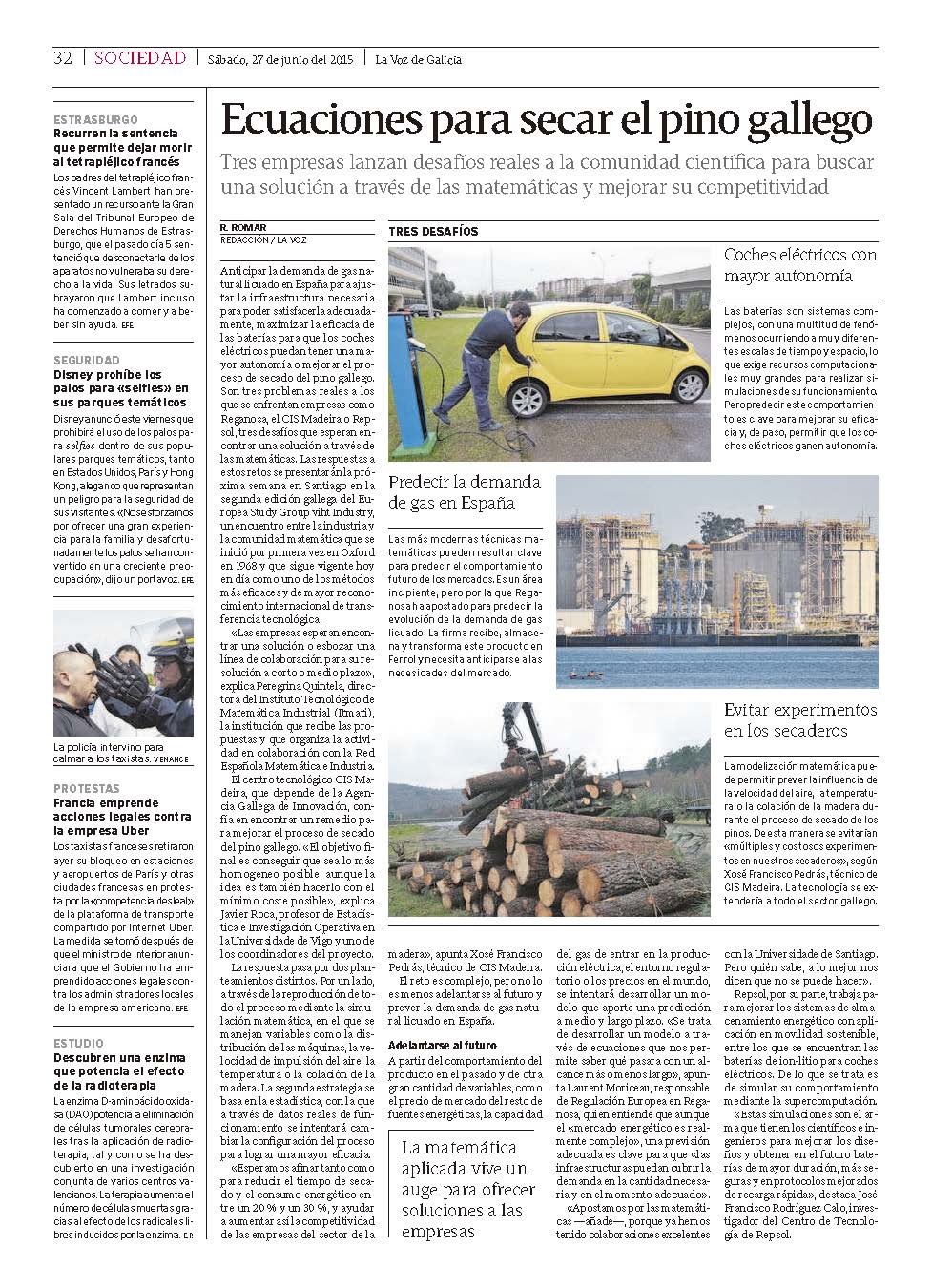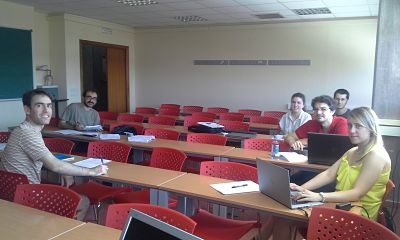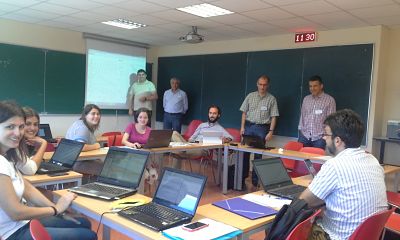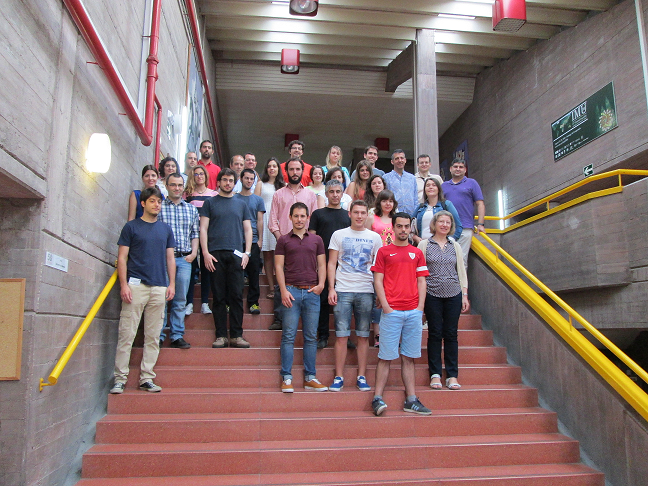Meeting between industrials, mathematicians and young researchers from June 29 to July 2,3 in Santiago: Companies seek greater efficiency in the mathematical technology
- 110A European Study Group with Industry (ESGI) is a methodology of knowledge transfer between industry and the mathematical community began in Oxford in 1968.
- Repsol is working to extend the life of lithium-ion batteries for electric cars, Reganosa expected ahead of demand for liquefied natural gas in Spain and CIS Madeira requires improving energy efficiency during the drying process of Galician pine
- In parallel, a score of young researchers work to become the new quarry of "industrial mathematicians" during the II Iberian Modelling Week.
From June 29 to July 2, Santiago hosts the second Galician edition of the European Study Group with Industry (ESGI); a meeting between industry and the mathematical community began in Oxford in 1968 that continues today as one of the most effective and most internationally recognized in the field of technology and knowledge transfer methods. At this meeting, organized by the collaboration between the Technological Institute of Industrial Mathematics (ITMATI) and the Spanish Network for Mathematics & Industry (math-in), among others partners, Repsol, Reganosa and CIS Madeira (GAIN), a organization dependent Xunta de Galicia, present a challenge or "mathematical problem" detected in their activity that could be deal with mathematical technology.
After four days of work, "the companies hope to find a solution or have outlined a cooperation line for resolution in the short / medium term. These results will be presented on July 2, during the conclusion of the meeting between scientists and industrial mathematics researchers, “explains Peregrina Quintela, director of ITMATI and president of math-in.
After four days of work, "the companies hope to find a solution or have outlined a cooperation line for resolution in the short / medium term. These results will be presented on July 2, during the conclusion of the meeting between scientists and industrial mathematics researchers, “explains Peregrina Quintela, director of ITMATI and president of math-in.
Los tres retos que presentan las Industrias:
- Repsol works to improve energy storage systems with applications in sustainable mobility, including the li-ion batteries for electric cars Batteries are complex systems with a multitude of phenomena occurring at very different scales of time and space, which require very important resources for rigorous computational simulations of operation. "These simulations are the weapon that Repsol scientists and engineers have to improve designs in the future and get longer battery lives, safer and improved fast charging protocols," says Jose Francisco Rodriguez Calo, a researcher in Advanced Computing in Technology Centre Repsol. The incorporation of the latest mathematical techniques is the key to many other processes and the challenge presented by Repsol this week, is just one of the examples in which the Joint Research Unit Repsol-ITMATI works.
- The company Reganosa receives stores and transforms Liquefied Natural Gas (LNG) through its terminal in Mugardos, in the port of Ferrol, and need to anticipate to the needs of the Spanish market. And, "The energy market is really complex," notes Laurent Moriceau, European Regulation Manager on Reganosa, " and “a greater accuracy of forecasts of LNG imports is key to infrastructures can meet the demand in the quantity required and at the right time ".
- In addition to these two great companies, in this workshop participates the Center for Innovation and Technological Services dependent on the Galician Innovation Agency (Xunta de Galicia) CIS Madeira (GAIN), that aims to improve the drying process of Galician pine. "Mathematical modeling will allow us to predict the influence of air velocity, temperature and glue drying of the wood during the drying process and avoid multiple and expensive experiments in our drying," explains Francisco Xosé Pedras, Technician in CIS Madeira. "In this workshop we will save time and hope to have data in a few months to rethink the process, specifically, we hope to refine enough to reduce the drying time and energy consumption by 20 to 30 percent; and help to increase the competitiveness of companies in the wood sector.”
The new quarry of industrial mathematicians:
In parallel, a score of young researchers and academics work to become the new quarry of "industrial mathematicians" during the II Iberian Modelling Week, which will take place between June 29 and July 3, also in Santiago. And, find solutions to industrial problems through applied mathematics, statistics and operations research is already a professional profile demanded in the labor market. "More than a new profile is a profile that is consolidating," notes Elena Vazquez Cendón, Associate Professor of Applied Mathematics at the University of Santiago de Compostela and affiliated researcher of ITMATI, and Coordinator of the Masters in Industrial Mathematics USC (M2i). In the employability study of the Master in Industrial Mathematics (M2i), the employment rate is over 80% and, for the past two years marked by the crisis, the average salary improved, as did the quality of jobs, "he concludes.
- GT of the problema: Model Order reduction for Li-ion batteries simulation at cell scale (Repsol), coordinated Jerónimo Rodríguez García, Affiliated research of ITMATI and Substitution Interim Professor, University of Santiago de Compostela and David Aller Giráldez, Technologist in Emerging Business Technology, Technology Center Repsol.
- GT of the problema: LNG import forecast in Spain (Reganosa). Coordinator: Manuel Febrero Bande, Affiliated researcher of ITMATI and Professor of Statistic and Operations Research and Laurent Moriceau, European Regulation Manager in Reganosa.
- Peregrina Quintela, Director of ITMATI (front right) and some participants in 110A European Study group with Industry and II Iberian Modelling Week.
PRESS REALEASE: (CLICK HERE TO DOWNLOAD)
MENTIONS IN NEWS: 110A ESGI and II Iberian Modelling Week
- Xornal da USC (26/06/2015)
- La Voz de Galicia (27/06/2015)
- Portal Web da Xunta de Galicia (29/06/2015)
- El Correo Gallego (01/07/2015)
- Efe Escuela (01/07/2015)
- Blog de Repsol (03/07/2015)
- Móstoles Tecnológico (09/07/2015)
The 110A ESGI will be held in collaboration between the Technological Institute for Industrial Mathematics (ITMATI) and the Spanish Network for Mathematics & Industry (math-in). It is also funded by the Thematic Network RTmath-in, granted by the Ministry of Economy and Finance within the dynamic actions "Networks of Excellence" at 2014 call and by the Industrial Mathematics Technology Network (Red TMATI), granted by the Department of Culture, Education and University of the Xunta de Galicia.
This 110A ESGI is framed as activity in the Joint Research Unit ITMATI-Repsol which has funding of the Galician Agency for Innovation and the Ministry of Economy and Finance in the framework of the Spanish Strategy Innovation in Galicia.
Fecha:
Tue, 2015-06-30 











